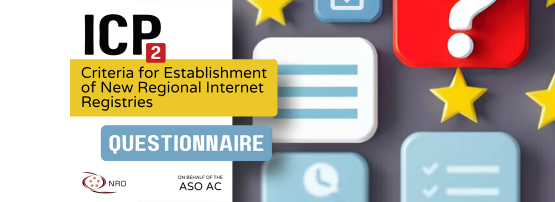
Over recent weeks, the Regional Internet Registry (RIR) community has considered revising the Internet Coordination Policy 2 (ICP-2), titled ‘Criteria for Establishment of new Regional Internet Registries’. Originally introduced in 2001, it was designed to guide the creation of new RIRs in Latin America, the Caribbean, and Africa and was approved by the ICANN board at that time.
However, the RIR community, led by the Number Resource Organization (NRO), has recognized that ICP-2 does not adequately address the challenges the RIR system might face. In response, the NRO’s Number Council (NRO NC, which also serves at the Address Supporting Organization Address Council (ASO AC)), has begun revising ICP-2 and has proposed a new set of principles for community feedback. The deadline to provide feedback is Friday, 6 December. You only have two days left to contribute!
I have long been involved in the RIR community and am strongly interested in the ongoing revision process. This interest goes beyond the specifics of the ICP-2 provisions; it’s also a valuable opportunity for the community to reflect on the broader role and purpose of an RIR. In addition to my activities in the APNIC region, I have been reaching out to the Japanese community at various events, including the Japan Internet Governance Forum (IGF) and Japan Open Policy Meeting (OPM), both held in November.
Japan IGF
When I proposed a session for the Japan IGF, I knew I had to take a multistakeholder approach and include speakers with a strong understanding of Internet coordination and governance, who could engage in meaningful discussion. Two individuals came to mind, and both graciously accepted the invitation.
The first is Mr Yasu TANIWAKI, Vice President of IIJ, who has also served as Vice Minister of the Ministry for Internal Affairs and Communications. JPNIC previously invited him to give a guest lecture at its General Meeting, where he spoke on ‘Digital Cold War and Internet Governance’. His analysis and perspective on Internet governance relating to international politics was excellent.
The second is Mr Shin SHIRAHATA, Managing Director of BBIX Singapore. I had the pleasure of working with him on a JANOG session about the ‘Splinternet’ during JANOG 54 in Hakodate in July 2022. I was impressed by his deep understanding of the power dynamics among big tech companies in shaping Internet infrastructure and coordination.

The Japan IGF session began with my presentation on the ICP-2 revision, where I introduced the draft principles and provided some background context. Taniwaki-san asked whether the RIR system has an appeal/dispute resolution, noting that such mechanisms exist in intergovernmental contexts to resolve disputes between member states.
During his presentation, Taniwaki-san shared his perspective on the multistakeholder process, referencing a document titled ‘Definition and Types of Multistakeholder Process’, published by Japan’s Cabinet Office. He highlighted that a multistakeholder process is most effective when there is no significant conflict preventing dialogue between parties and when the ultimate goal is widely shared by all participants.
Shirahata-san followed Taniwaki-san’s intervention with several points that may require further consideration:
- Do RIRs employ data escrow?
- Is this issue also relevant for NIRs?
- Should the deployment of RPKI be seen as enhancing the enforceability of RIRs, and does this underscore the importance of proper governance?
- Appeal/Dispute Resolution: While RIRs have not faced severe market competition, making such mechanisms unnecessary, ICANN, with its management of gTLDs, has established and evolved appeal and dispute resolution processes.
The following key points emerged after a lively audience discussion:
- The need for institutional evolution as the market develops.
- Concerns about how global Internet coordination mechanisms can be influenced by jurisdictional issues.
- The potential need for data escrow if de-recognition is part of the life cycle.
- The introduction of past case studies from APNIC, AFRINIC, and ICANN regarding jurisdiction selection.
Japan Open Policy Meeting
Two weeks later, at JPOPM 47, which attracted a smaller group of seasoned engineers from the JPNIC community, I conducted another session on my own. I presented the draft principles and received valuable feedback. Some of the key questions and comments from the floor were:
- What kind of organizations could take over after the de-recognition of an RIR?
- Considering the evolution of the number management scheme — from InterNIC to three RIRs, and then five — what is the rationale for maintaining the current system of five RIRs?
- What about the possibility of an Interplanetary RIR as a sixth?
These are all important and insightful contributions. Some may fall outside the scope of the ICP-2 revision, but they are still highly relevant to discussions on the future evolution of the RIR system.
My next presentation of this nature will be at JANOG 55 in Kyoto in January 2025. I hope these sessions will help generate greater awareness of RIRs and JPNIC within the Japanese community, and encourage deeper engagement with global Internet coordination efforts.
The views expressed by the authors of this blog are their own and do not necessarily reflect the views of APNIC. Please note a Code of Conduct applies to this blog.
